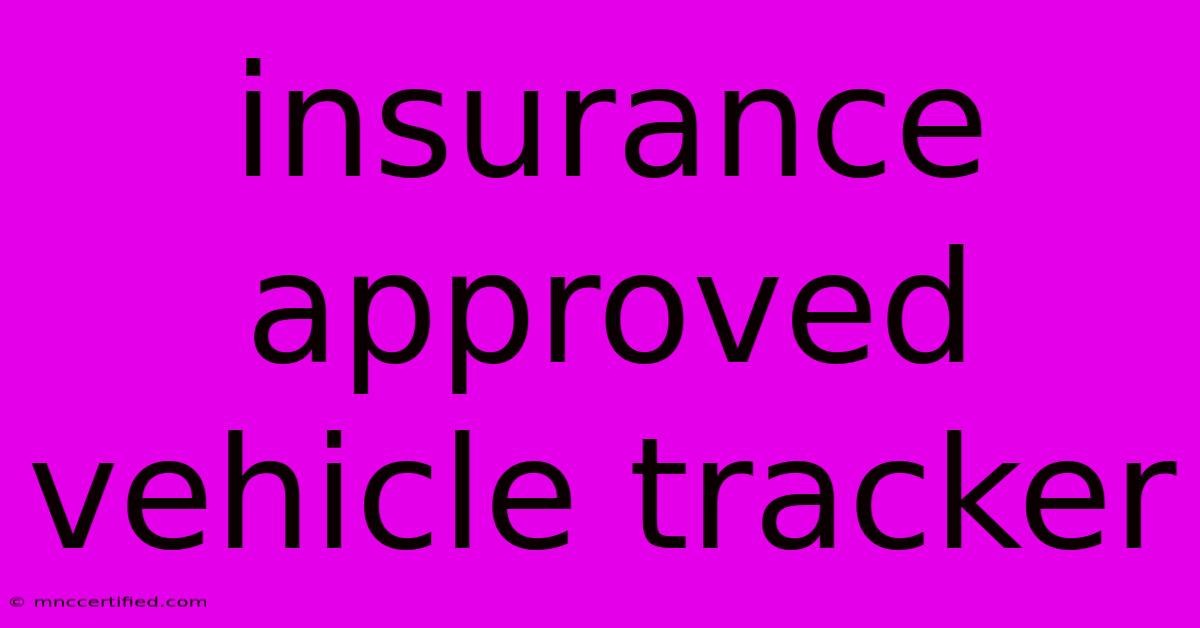Insurance Approved Vehicle Tracker

Table of Contents
Insurance Approved Vehicle Trackers: A Comprehensive Guide
Finding the right vehicle tracker can be a daunting task, especially when it needs to meet your insurance company's requirements. This comprehensive guide will help you navigate the world of insurance approved vehicle trackers, explaining what to look for, how they work, and the benefits they offer.
What is an Insurance Approved Vehicle Tracker?
An insurance approved vehicle tracker is a GPS tracking device that meets specific criteria set by your insurance provider. These criteria often involve aspects like:
- Accuracy and Reliability: The tracker must provide accurate location data consistently, even in challenging environments.
- Data Transmission: Reliable data transmission to a monitoring center is crucial for effective tracking. This often involves cellular connectivity.
- Tamper Resistance: The device needs to be resistant to tampering or removal, ensuring continuous monitoring.
- Approval from Thatcham or Other Recognized Bodies: Many insurers require trackers certified by Thatcham Research (in the UK) or similar recognized bodies in other countries. This certification signifies that the tracker meets rigorous security and performance standards.
- Installation by an Approved Installer: Some insurers mandate professional installation by an approved installer to guarantee proper functionality and to maintain the warranty.
Benefits of Using an Insurance Approved Vehicle Tracker
Choosing an insurance-approved GPS tracker offers several key advantages:
- Reduced Insurance Premiums: This is the primary benefit. Many insurance companies offer significant discounts on premiums for vehicles fitted with approved tracking devices, demonstrating a commitment to vehicle security.
- Enhanced Vehicle Security: Trackers deter theft and help recover stolen vehicles quickly. The ability to remotely locate and immobilize a vehicle drastically increases the chances of recovery.
- Improved Claims Processing: In the event of a theft or accident, accurate location data from the tracker can streamline the claims process, providing quicker and more efficient assistance.
- Peace of Mind: Knowing your vehicle is being monitored provides significant peace of mind for both drivers and vehicle owners.
Choosing the Right Insurance Approved Vehicle Tracker
Selecting the right tracker involves careful consideration of several factors:
- Insurance Company Requirements: Begin by contacting your insurance provider to understand their specific requirements for approved trackers. They may provide a list of approved devices or specify the minimum standards.
- Features: Consider features beyond basic tracking, such as driver behavior monitoring (for potential discounts), geofencing (alerts when the vehicle leaves a specified area), and remote immobilization capabilities.
- Subscription Costs: Remember that ongoing subscription fees cover data transmission and monitoring services. Factor this into your overall cost assessment.
- Installation Process: Check the installation process and whether your chosen provider offers professional installation services. Ensure this is covered by the warranty.
Finding and Installing an Insurance Approved Vehicle Tracker
The process typically involves these steps:
- Contact your insurer: Get a list of approved trackers or their specifications.
- Research and select a tracker: Compare features, pricing, and subscription costs.
- Choose an installer (if required): Opt for an approved installer if your insurer mandates it.
- Have the tracker professionally installed: Ensure proper installation for optimal performance and warranty coverage.
- Activate the tracker: Follow the provider's instructions to activate the tracking service.
Keywords for SEO Optimization
Here's a list of keywords to optimize your content for search engines:
- Insurance approved vehicle tracker
- GPS tracker for insurance
- Thatcham approved tracker (or equivalent for your region)
- Vehicle tracking device insurance discount
- Stolen vehicle recovery tracker
- Best car trackers for insurance
- Insurance telematics
- Remote immobilizer tracker
- GPS tracking system insurance
- How to choose a vehicle tracker for insurance
By incorporating these keywords naturally within your content and utilizing relevant headers and formatting, you significantly improve the chances of ranking higher in search engine results pages (SERPs). Remember to build high-quality, informative content that truly helps users find the answers they need. Off-page SEO techniques, such as link building and social media promotion, are also crucial for long-term success.

Thank you for visiting our website wich cover about Insurance Approved Vehicle Tracker. We hope the information provided has been useful to you. Feel free to contact us if you have any questions or need further assistance. See you next time and dont miss to bookmark.
Featured Posts
-
Insurance For Bounce House Rentals
Nov 16, 2024
-
My Scotland Photos Country Images
Nov 16, 2024
-
Western National Insurance Reviews
Nov 16, 2024
-
Lenny Rush Children In Need Star
Nov 16, 2024
-
Pollution Liability Insurance Cost
Nov 16, 2024